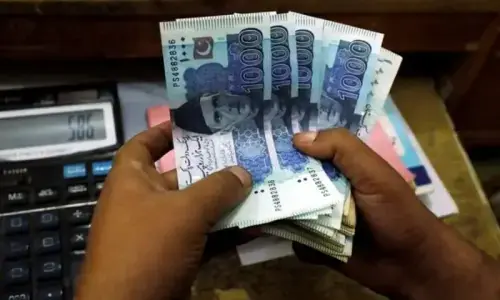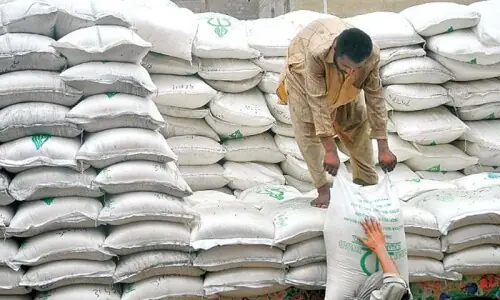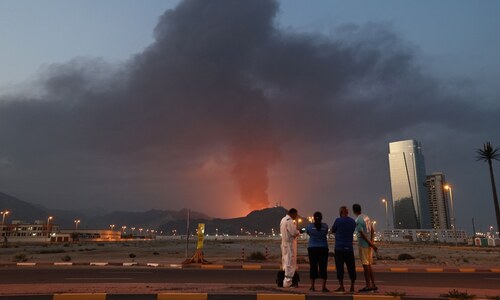Making medicines still more unaffordable?
THE discussion going on these days about the prices of medicines is one way of looking at the rising cost of health care for the common man, who is already very sore about hikes in the prices of power, petrol and other necessities of life.
The question is not that of just the proposed 15 per cent GST medicines, but whether the people will be able to afford the overall medical costs such as visiting a doctor and paying hospital bills. Put into effect, the proposed GST would hurt the poor most, as well as others.
It is significant that there has been a unanimous opposition to this condition of the IMF — political parties, consumers’ representatives and others all oppose the GST on medicines. For all the philosophy and macro- economics that decision-makers and planners may come up with, the common man is unable to stomach the arguments that seek to rationalize the proposed GST.
There are some signs, as one writes this column, that a review of the GST will be made, and that second thoughts may hopefully prevail. But somehow the public perception with regard to prices, generally speaking, are very grim, bleak. This raises questions that were heard at a symposium, under the aegis of the Pakistan Society of Physicians, held at Liaquat National Hospital earlier this month. A Dawn report on March 9 said that Dr Manzoor Ahmed “discussed the mechanisms involved in the rapidly growing ‘healthcare business’ in Pakistan where the most important ethical concern, the human factor is ignored. One’s immediate response to this was that apparently the Pakistani society is gradually showing a declining concern and interest in the human factor in so many spheres.
The use of the expression “healthcare business” is reflective of what is happening on the healthcare scene in Pakistan. Perhaps if it is a business, then the concept of General Sales Tax on medicines, and other aspects of medical care are acceptable. But it is this obvious commercialization of health care that is being resisted, and quite understandably so. For if stretched to its unrestrained limits, it is obvious that the common man would be unable to afford even existing medical facilities.
Now ever since this move to impose a 15 per cent GST was announced, one has not only seen tremendous anxiety among patients and their families, but at the same there have been appearing reports that “pharmaceutical dealers have stopped lifting medicines from the industries concerned, due to the imposition of the above-mentioned tax. “And not surprising was it to read reports that “most of the wholesalers and stockists have started hoarding their previous stocks of medicines with a view to selling these medicines with a 15 per cent GST after the Muharram holidays!”
There have also appeared news reports that shortages of sorts had begun surfacing, and that overcharging had begun to be witnessed as well. On this point one would like to underline the point that the uneducated patient- consumer is more likely to be fleeced. In fact, this is the fear that when this GST is imposed, fleecing will reign, especially in the initial stages.
But that is not the precise point. The concept of a GST on something as essential as medicines, keeping in mind the fact health care is still beyond the reach of the common man, is not acceptable. And how can it if we keep in mind the purchasing power of the majority of people, and we keep in mind the fact that there is an allround price rise taking place.
Come to think of it, there is a chorus of demand that children of the poor be also sent to school. And yet primary schooling is steadily turning expensive, as private schools do their business, then as awareness of medical concepts and healthcare needs grow in society, the costs seem to rise, making the facilities still more unaffordable. Strange in a way, and simple citizens wonder why institutions such as the IMF and the World Bank want to make basic things, integral to decent daily living, so awfully expensive. Why don’t they tax the rich? Why don’t they bring in new people into the tax net instead of squeezing taxes out of those people who are already in the tax net? Such questions are being heard once again as fears of GST on medicines bring fresh unhappiness and anxiety into people’s lives.
It is imperative to mention here that in addition to the 15 per cent GST the federal government has also allowed a fresh 3 per cent increase to importers and producers in the retail prices of 821 medicines, used for the treatment of all major diseases, with retrospective effect from December 2001. An increase of 18 per cent and with other operational costs going up, the aggregate could be a neat clean 20 per cent.
But it will not be tidy and clean for the common man. It will make his life uglier and messier, and healthcare budgets in hospitals and other institutions concerned will be rendered still more unrealistic.
Unrealistic. That is the most appropriate word for any attempt to raise the prices of medicines today. Except for the IMF itself, there is not being heard any voice of support for the GST on medicines. But then, according to a report, the choice is between ghee and medicines. We are in for tougher times, one way or the other, brother.
Kitsch and confusion
WRITERS have manifold duties in society. Entertainment may be the most favoured of all being the most rewarding and safe, but among others the exposure of sham and pretence and cleaning popular concepts of comforting cobwebs are the more challenging works, though undoubtedly, avoiding kitsch appears to be the most difficult, particularly these days when winning quick acclaim requires only a little stupidity and some attendant persistence. Manto, Ahmad Bashir, Khushwant Singh and some others have used their pen admirably stripping idols in the glorious tradition of Lytton Stratchey (Eminent Victorians), though with less labour and more personal zest, which is quite understandable in a culture such as ours. Among columnists Art Buchwald does that on a daily basis. He can, because he has so much happening around him. But in our not so dynamic and depleted milieu the need to tear apart noxious contemporaries is not as urgent as to bring clarity in our meagre thought content. Though this might unfortunately result in slowing the gushing fonts of poetry that so often serve to cloak the enormous haze of our confusion. It is not exactly a literary matter to mention the ugly turn events took in the Indian state of Gujarat but it does exhibit the deadly consequences of nurturing hazy concepts that people are not educated to understand. Secularism is a familiar word but even to people who accepted it as state policy its exact meaning in practical terms has not been very clear. The confusion became confounded when Hindutva proponents also became its votaries and demonstrated in terms of blood and gore what they understood to be its meaning. Those who witnessed this orgy in silence were victims of the kitsch that proliferated in the writings of Hindutva intellectuals.
A similar phenomenon is noticeable in 97 per cent Muslim Pakistan where the meaning of an Islamic polity has never been explained to the people, nor the historical fact that the only true Islamic state that ever existed ceased as a practical reality after three of the four blessed righteous caliphs were martyred. The confusion resulting from ignorance of historical facts and popular myths of glory spread by writers of fiction like Nasim Hejazi and countless pen-pushers who have been engaged in distorting history, has manifested itself in obscurantism and sectarianism of the worst kind. Columnist Ayaz Amir has drawn our attention to the subhuman faces of the tailless bipeds performing their sacred duty in the streets of Gujarat that Praful Bidhwai and Kuldip Nayar has described as a pogrom. However, newspaper pictures of policemen guarding mosques in Pakistan is a sight no less disturbing. These are pictures of South Asian confusion. They explain why poet Atal Behari Vajpayee talks so haltingly. What has this problem of conceptual confusion got to do with literary or artistic pursuits?
Progressive writers persist in their insistence on the meaningfulness of the creative product only in its relevance to social reality. Only the other day (Friday) at the Pakistan National Council of the Arts (PNCA) where painter Ali Imam was speaking at the “Dialogue on Art” programme, Kishwar Nahid raised the issue of non-responsiveness of creative people to the enormous issues that were surfacing and when society in general was at a loss and the layman was caught between conflicting positions and needed guidance to do the right thing. Ali Imam thought that was due to general insecurity as nobody could risk his bread and butter by coming out in the open. The days of commitment were over. We were living in the age of compromise and consensus, what Aslam Azhar, who was also there, described as the dictatorship of consumerism. One ate and wore what the multinationals told one to munch and don.
In the recent past, one is comforted to note, quite a few of our intellectuals were undaunted by the surge of jingoism that swept the land in the wake of the atomic explosions. Eminent journalist and chronicler Zamir Niazi has recorded this response of the progressive and humanist fringe of our intellectuals, poets and fiction writers in his valuable collection Zameen Ka Nauha of which a revised edition has just appeared thanks to Asif Farrukhi’s yeoman services. It is a must reading for all lovers of the bomb in South Asia and also those across the Atlantic whose claim to civilization rests on their ability to annihilate not only every living thing on earth with their nuclear arsenal but also their shadows, as Sahir said. The book has three parts: Jauhar-i-Andesha that includes essays by Zamir Niazi, Khaliq Ibrahim Khaliq and Asif Farrukhi; Hiroshima featuring fiction by Ahmad Nadim Qasmi, Manto, Hassan Manzar, Suzuki Takeshi, Salimur Rahman and verse by Ahmad Fraz, Sheikh Ayaz, Habib Jalib, Parvin Shakir and others. The third section entitled Pokhran and Chaghi is again a very rich collection of poetry and prose that records the reaction of our writers and poets to the explosion.
To conclude: kaho keh aaj bhi ham sab agar khamosh rahe
to is damakte huae khakdan ki khair nahin
junoon ki dhali hui atomi balaon se
zamin ki khair nahin,
aasman ki khair nahin.
Pir Hussamuddin Rashdi: a gifted intellectual
PIR Hussamuddin Rashdi was an eminent research scholar, a towering intellectual, a historian par excellence, a giant litterateur and a man who was noble, modest, profoundly gentle, gracious, frank and friendly.
He gave new dimensions to history-writing particularly the history of Sindh.
Those who had the opportunity of attending his regular sittings, accompanied him in his strolls in the Elphinstone street or attended his evening literary gatherings at his residence in Al-Hamra, place his lofty human values higher than his intellectual standing.
Pir Sahib did not keep good health towards the end of his life and as such he had stopped attending functions and writing forewords for the books of other writers. However, despite his indisposition he wrote the foreword for my collections of poems titled “Tand Kataro Kandh.”
Hussamuddin Rashdi proved through his works that he was a preserver of human values, rites and rituals, traditions and culture. He was the custodian of the heritage of human history, which includes the ancient culture, and civilization of the Indus Valley. He unveiled many truths about the history of Sindh which were hitherto not known to the people of the Mehran Valley.
The most amazing aspect of his life was the fact that he had no formal education. He did not attend any school, college or university. Yet he could guide and teach professors, lecturers, educationists and a vast number of the seekers of knowledge.
Pir Sahab wrote, compiled, edited and enlarged the scope of many books and got them published. His books contain valuable material on the chequered history of Sindh. Some of his famous books are: Tuhfatul Kiram, Maqalat-ush-shuara, Maklinama, Tareekh-i-Mazhar Shahjahani, Tazkira-i-Shuara-e-Kashmir, Hadeeqatul-Auliya, Mir Mohammad Masoom Bakhri, Hoo Dothi, Hoo deenhan and Galhyoon Goth-waran joon.
Despite his own monumental works on the history of Sindh, he felt very strongly that there was still a lot to be done and written on the many aspects of Sindh’s history to make it updated and complete in all respects. He writes in Maklinama: “The history of Sindh could be shaped in a proper manner only if the dust of time gives way and the hidden treasures about Sindh come out; the historical sites are excavated and explored and the books about Sindh within Sindh and abroad are collected and the material therein compiled, edited and published.
“It is very difficult to write and do justice about any country or an ancient civilization especially Sindh and the Sindhis whose tastes, traditions, culture and point of view on the national issues are different. It is therefore the need of the hour that before attempting to write the history of Sindh in its true perspective, we should know the viewpoint, likes and dislikes of the Sindhis and analyse the same in their historical background. Since no sincere efforts in this direction have yet been made, it would be futile to demand and expect a comprehensive history of Sindh at the moment. The first and foremost step therefore is to collect the whole scattered material about Sindh individually and collectively with the national zeal and spirit. This would be tantamount to collecting the building-material before the start of the construction of the building itself.
Several noted writers paid glowing tributes to Pir Hussamuddin Rashdi on his remarkable achievements. Among them were Shanul Haq Haqqi, Jamiluddin Aali, Pareshan Khattak, Ghulam Ali Allana and Jameel Jalibi.
His brother, friend, writer and scholar, Pir Ali Mohammad Rashdi, describes his illustrious younger brother as follows:
‘He wrote so many books in Persian, Sindhi and Urdu. All the voluminous and very precious books are the result of his hard work and research. He has saved the rare treasure of Sindh from destruction. He has left a vast material on Sindh both published and unpublished. He has laid down the foundations of history writing and gave a new meaning to the literature of Sindh. He was a true lover of Sindh as such he left a will that, after his death, he may not be buried beside his father and mother but beside Shaikh Abdul Majeed Sindhi in the national graveyard of Makli, Thatta. There could be no match to his true love and sacrifice than his will. He will henceforth get up on the Doomsday along with other saints and martyrs whom he has very eagerly mentioned in his great book, Maklinama.’
Pir Hussamuddin Rashdi lives in the hearts of the people who love, respect and adore him.
(Pir Hussamuddin Rashdi’s 20th death anniversary is being observed today.)
The stuff that sells evening papers
ACTRESS Nargis and her family told police and press last week a former police officer had been stalking, blackmailing and exploiting her for years. Four months ago he was involved in an armed robbery at her sister’s house. Last week, he trespassed her house, held the entire household at gunpoint and demanded Rs10 million and ownership papers of her property. For her reluctance to oblige she was abused, threatened with mutilation, tonsured and beaten black and blue. Nargis said there were 39 injuries including a fracture and that the beating had left her unfit to reproduce. While leaving finally, the former inspector, left behind an accomplice who has been arrested by the police.
The accused officer, Abid Boxer, is no stranger to scandal. Joining the service on sports quota, he gradually earned a reputation for ‘effectiveness.’ During the Sharif years, when ruthlessness was on a premium, he was one of the officers leading the crusade against crime, allegedly by operating above the law. According to newspaper accounts he was involved in 40 fatal encounters, a euphemism for execution without trial. Later, he was charged with extra-judicial killing and corruption and sacked. At his nadir, while detained at the Chuhng anti-terrorist cell for interrogation, he was reported to have attempted suicide. He has denied the charges, as well as Nargis’s acquaintance.
As a celebrity Nargis has commanded the privilege of a captive audience. As a law enforcement officer, Abid had enjoyed a presumption of truth and bonafides. Having their word doubted and being called to back it with evidence will be frustrating. But there is just about room for at the most one of them to be telling the truth. Abid’s tiff with colleague Haseeb Anjum was blamed on their rivalry over Nargis. So was Tahir Prince’s death in an ‘encounter.’ Denying even the acquaintance may have been an overkill. On the other hand, Abid’s ‘accomplice’ has claimed indeed to be Nargis’s accomplice and several people in the film industry have stated that the actress had planned to shave her head for an unusual role.
And this is far from being the only disappointment. While artistes, particularly female stars, were quick to express solidarity with Nargis, the assault can only have added to her doubts about society and her place in it. There was obviously some confusion about the relationship with Abid or the lack of it. Also, only recently when a large number of stage artistes were arrested for alleged violations of a code of conduct, she was reported to have told reporters she found the raids confusing. Why, she wondered, could the government not make up its mind about its cultural policy? Why should the performance for which she was included in state-sponsored troupes to represent the country abroad, be banned at home?
The sore point about an artistes’ place in society was also mentioned by others. Somebody suggested that Ghulam Abbas, celebrated generally for his stories, Anandi and Overcoat, but more recently also for Dhanak, may still be relevant. So resigned are the entertainment workers in his Naak Kaatnay Walay, that they cannot even postpone sleep to finish discussing a particularly ugly harassment episode.
Nor can it be any easier for Abid. It is possible to understand the feeling of betrayal by the system without necessarily agreeing with the type he represents. Many policemen, as well as other pubic functionaries, allow their superiors and governments to use them for dirty work for which no one will ever accept responsibility. They ignore, or fail to understand, in their haste to take the opportunity, that if you are used like a prophylactic, you have to be discarded as soon as the need is over. Hence the heartbreak.
Then there are other hazards. Routinely doing dirty work as duty, one might start equating duty with dirty work. Also, called in the line of duty to suspend moral judgment whenever something ‘must be done’ one might altogether lose the faculty. No wonder so many officers are believed to have taken to using police methods — and resources — for personal ends.
WHILE the case of the persecuted artiste is likely to retain some of the mystery, that of the Lala Musa children is stark and simple.
A brother of a former MNA and the incumbent district Naib Nazim was furious over the distraction caused by a street urchin during the Ashura procession, allegedly by trying to pick a pocket. Not given by temperament to taking such things lightly, he took the boy and his three mates, all 12 to 13 years old, to his village outhouse where their heads and eyebrows were shaved and ferocious dogs were set on them. They were then given a thrashing that has required hospitalization for treatment and detained for nearly 20 hours before being handed over to their suitably intimidated families.
One of the victims who managed to escape was caught by the police and handed back to his tormentors.
A doctor at the Civil Hospital refused to treat the children.
Neither the victims’ families nor the neighbours dared approach the police who were finally forced to register a case when an intelligence agency reported it.
There have been no arrests.
YOU have to hand it to them. When they start something, our president and our governor, make a campaign of it. Last week, they were again canvassing for their favourite candidates. The latter for the former and the former for Imran Khan.
Mr Khan returned the compliment finally by announcing that the president was doing good work and should continue. He also told reporters a referendum was not the evil some people were trying to make it out. In fact, had it not been for Gen Zia, he said, there would be no need for him to explain that it was quite democratic.
Well, opinions vary on that point. Mr Ejazul Haq, for one, warned last week that if Gen Pervez Musharraf wanted a referendum on his presidency like his famous father, he should be prepared for the inevitable comparison which, he implied, would be none too flattering. The secret of his father’s popularity with the masses, he pointed out, was his great deeds.
THE Parks and Horticulture Authority has announced a sponsorship deal with a tobacco company that will allow it to recover most of its original investment in the Gowalmandi Food Street. It will also provide new facilities and funds for maintenance. The PHA did not say what the generous sponsor would get out of the deal. — ONLOOKER
The scoundrel who outlived the sage
WHEN we think of Garhi Shahu, we think of the railway station, we think of the Christian community, we think of the Burt Institute and that wonderful dance club that no longer functions, and we think of the Convent of Jesus and Mary. But surely there is much much more to this place than we have ever cared to explore.
The pinnacle of fame for the Garhi Shahu area was during the British period when the rail track was laid, and being an engine driver was the ‘in thing.’ Initially all the engine drivers were British, and the Raj laid out beautiful residential colonies for them near the rail track, starting from the still superb Mayo Gardens to the Burt and to the other colonies on both side of the old Mayo Road, now renamed after Iqbal. Just why do we have to forget our history, one will never know. The British then started inducting into the railways Indian Christians, mostly of Portuguese origin from Goa. Lahore was full of D’Souzas, D’Sylvas and Ferrairas, not to speak of the fairer skinned British origin names like Burtons, Brians and Nibletts.
They were also inducted into the railway police, and later on into the Punjab police, and all of them served with distinction. Today, almost all of them have flown, for very valid reasons of our prejudices, to cooler climes. The social and cultural environment of Ghari Shahu was markedly different from the rest of Lahore, and it was a much sought after area.
But then the real story of the area must begin from the days of Emperor Shah Jehan, for during his reign an Arab sage by the name of Abul Khair came to Lahore. He was a well-known scholar of Islamic jurisprudence who had set off on his travels from Baghdad. On reaching the Punjab, he found the weather most agreeable to his temperament and decided to stay a while in Lahore. In those days, the area now known as Garhi Shahu was known as Mohallah Syedan, because in this area lived scholars like Syed Jan Muhammad Hazuri, after whom is named the famous Hazuri Bagh. The intellectual environment was much to his liking and he decided to settle down here.
During the reign of Emperor Aurangzeb, the fame of Abul Khair had spread far and wide, and the emperor wished that the maximum number of people should benefit from the sage. He ordered that a madressah be built for Abul Khair and a suitable residence be arranged for the scholar. A maintenance fee was also ordered by a firman for the upkeep of the house and the madressah. And so Abul Khair’s institution was founded. Today it exists, empty and derelict on one edge of a small graveyard at the end of a small lane as the road curves towards the main Garhi Shahu crossing.
Abul Khair kept teaching in his madressah till the age of 105, and on his death he was buried here, as were other well-known persons of that age. As the Mughal empire was folding and anarchy was slowly setting in scholarship and learning were no longer on a premium. Lahore was ruled by three Sikhs before Maharajah Ranjit Singh finally managed to bring order for 40 odd years. During this period anarchy reigned supreme, and the madressah was taken over by a khalifa by the name of Muhammad Naeem, who taught there. On his death there was a void.
But anarchy has rules of its own, and it knows how to fill in voids on its own accord, just like in our times ‘qabza groups’ make a mockery of the law. In a way very little has changed. The house and madressah that existed near the crossing of the present-day Garhi Shahu had many scoundrels with an eye on it. People started stealing bricks from the buildings of the madressah. Groups of dacoits set upon the students of the madressah and stripped them of their meagre belongings.
Then a real godfather by the name of Shahu came along with his gang of rustlers, and he took possession of the buildings meant to accommodate Abul Khair and his scholars. They would steal cattle and other things from the area and keep them there for safekeeping. If the owners came, for a small price they would return their goods. Otherwise, they would be sold.
This was the age when the three Sikh rulers were restricted to their small domains. In between there was no law. The gang of Shahu ruled supreme, and it was from him that the name Garhi Shahu came. The Sikhs called it by this name, and so did the British, and so do we, and there seems no reason why we should change its name just because Mr Shahu was a shady character and lived a life very much like many a “respectable” citizen these days, and one does not say this in jest.
But the British changed the character of Garhi Shahu, for it was the hub of their entire effort to provide their forces and subjects with a means of communication that revolutionized life in a major way. Come to think of it, life is revolutionized by changes in the means of communication, like the internal combustion engine or the mobile telephone in own time. But who would have ever thought that an area that came up to accommodate a most learned man never kept his name, and a complete scoundrel managed to keep his name alive because he was a genuine ‘qabza group’ leader. Strange are the twists of fate that we see in Lahore, for every brick has a story to tell.



























